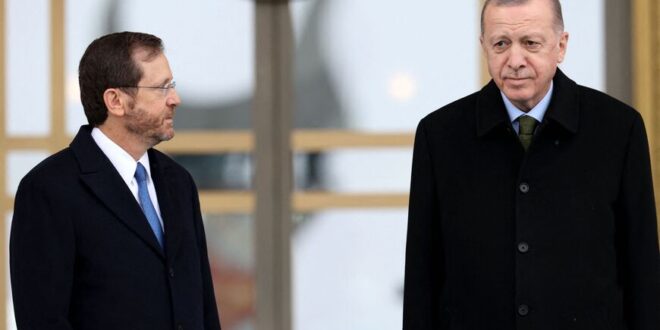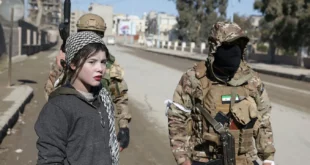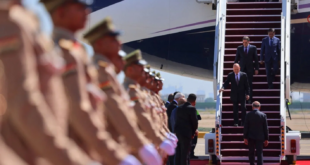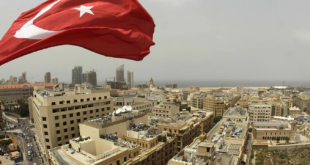Turkey’s foreign minister says he will gather with his Egyptian and Israeli counterparts, possibly with Defense Minister Hulusi Akar accompanying him to Israel.
Turkey’s Foreign Minister Mevlut Cavusoglu said that he would get together with his Egyptian and Israeli counterparts soon, in line with Turkey’s regional diplomacy efforts.
“There are important developments in regards to the ties with Israel. We will visit Israel within the month,” Cavusoglu told deputies of the ruling Justice and Development Party (AKP) earlier this week. The minister also noted that he would come together with his Egyptian counterpart, Sameh Shoukry, in an iftar (fast-breaking meal) in Istanbul before the end of the Islamic holy month of Ramadan.
While there was no official confirmation, the minister’s visit to Israel is expected to occur either at the end of April or in the first half of May. Ankara sources say that it is likely to take place after the Jewish Passover holiday, April 15-22, and after Ramadan, meaning in May. Cavusoglu is expected to be accompanied by Hulusi Akar, the high-profile defense minister.
Earlier statements that Israeli Prime Minister Neftali Bennett would visit Turkey, pronounced by none other than President Recep Tayyip Erdogan himself and never confirmed by the Israeli side, seem to have been replaced with rumors that Erdogan may visit Israel instead.
Cavusoglu’s announcement comes amid what Ankara diplomats call a “five-pronged diplomatic drive” toward its former opponents, namely the United Arab Emirates, Armenia, Saudi Arabia, Egypt and Israel. Of the five, Erdogan visited the United Arab Emirates in mid-February, mending a decade of strained ties and securing funding for Turkey’s battered economy. In an ice-breaking visit, Israeli President Isaac Herzog came to Turkey on March 9. The two leaders talked, among other things, of poetry and pipelines: Herzog recited left-wing poet Nazim Hikmet’s verses to convey a message of peace, while Erdogan insisted that his energy minister, Fatih Donmez, visit Israel as soon as possible. Donmez is to discuss how the two countries can cooperate, either bilaterally or via out-of-the-box multilateral cooperation, to create alternative sources of energy for European markets.
Diplomatic observers in Ankara say that Saudi Arabia may be next in terms of presidential visits, particularly after a Turkish court ordered the transfer of the trial in the murder of Saudi dissident journalist Jamal Khashoggi to Saudi Arabia last week. Erdogan will also visit Jordan as soon as the sides can agree on a new date for a visit that was postponed due to the emergency surgery of Jordan’s King Abdullah II this week.
With Israel and Egypt, the next round is at the foreign ministerial level, with an eye on full diplomatic normalization — meaning sending ambassadors back to each other’s capital. Currently, Turkey’s relations with Tel Aviv and Cairo are at the charge d’affaires level. More demure on normalization than Turkey, both countries see sending back ambassadors as leverage in their negotiations with Ankara, saying that more “trust” is needed before diplomatic normalization.
“There should be no doubt that Israel attaches great importance to its relations with Turkey and would rather have Turkey as an ally rather than an opponent,” said Hay Eytan Cohen Yanarocak, Turkey analyst at Moshe Dayan Center and Jerusalem Institute for Strategy and Security. “Yet Israel is not the same isolated country of the 1990s when it sought to please Turkey at all costs. It now believes that the bilateral ties should be a two-way street, a sustainable relationship built on trust that serves both partners.” In other words, Israeli diplomacy wants to make sure that it would not appoint an ambassador only to have them return before completing their term, as was the case in 2018. The same point on “lasting relations” was also raised by Cavusoglu in his meeting with Israeli journalists on April 13. He also said escalation in Turkish-Palestinian relations would have a negative impact on the rapproachment — which is nothing new to Israel.
The Abraham Accords between Israel and the UAE, Bahrain and Morocco — with Egypt and Jordan showing interest — and the tripartite relationship between Israel, Greece and Cyprus have made Israel stronger, Yanarocak told Al-Monitor. “Israel is unlikely to endanger its alliance with Greece and Cyprus — two members of the EU — for a fragile normalization with Turkey.”
For Israel, the top of the list is Turkey’s relationship with Hamas, the Islamic resistance group that won democratic elections in Gaza in 2006 and has ruled the strip since then. Israel considers it a terrorist group. Turkey hosts the largest number of Hamas leaders and members, following the movement’s strained relations with other Arab countries, particularly Egypt, Jordan and Syria.
“The Turkish side maintains that it has taken steps to close down Hamas premises in Istanbul; the Israeli side maintains that it has not been done. So the only logical thing is that both sides come together and reveal to each other what they have,” Yanarocak said, adding that the presence of Akar in the ministerial visit may facilitate this discussion.
Gokhan Cinkara, the CEO of Ankara Center for Global Politics, maintains that the visit of Akar to Israel, if realized, would be a turning point in ties. “It would mean that the defense and security cooperation, one of the driving points in ties in the 1990s, would be revived,” he told Al-Monitor.
Last month, Israeli Defense Minister Benny Gantz said that rapprochement efforts with Turkey also stem from the common security interests of the two countries. “Israel is building its relations with many countries in the region and is strengthening its cooperation in the face of threats in the region, especially Iran’s aggression and its attempt to break toward nuclear capabilities.”
There are minor signs of a bilateral thaw as well. For example, Turkey’s powerful Communications Directorate invited a dozen Israeli journalists on an official tour, during which they met with Cavusoglu. An Israeli and a Turkish think tank held a session in Tel Aviv and hope for a larger gathering soon. Ambassador Murat Mercan, a political appointee who has the ear of the president, penned an article for Moshe Dayan Center titled “Turkey and Israel: Optimism must prevail.” There are unconfirmed rumors that Turkey may name a career diplomat to Israel instead of Ufuk Ulutas, a political appointee who currently holds the post of director of the pro-governmental think tank, SETA, when it is time to name an ambassador.
With more and more political appointees to diplomatic posts, Turkey also named a career diplomat to Cairo as well. Salih Mutlu Sen, a senior career diplomat who served as Turkey’s ambassador to the Organization of Islamic Cooperation, will arrive at the Egyptian capital as the charge d’affaires, but should the ties be upgraded to the ambassadorial level, Sen can continue as ambassador.
In 2013, Turkey and Egypt severed diplomatic ties following Turkish criticism of the forced removal from office of Egyptian President Mohammed Morsi, who was backed by the Muslim Brotherhood. The hostile tone and occasional name-calling between Erdogan and Egyptian President Abdel Fattah al-Sisi continued for the next seven years, exacerbated by both ideological and geopolitical differences beginning with the Syrian crisis, extending to the Libyan war and the demarcation of maritime borders in the Mediterranean Sea, the so-called East Mediterranean energy rivalry, where Egypt sided with Greece and Cyprus.
The strained ties spilled over to absurd areas: Egyptian police raided Anatolia news agency offices in Cairo, accusing Turkey’s official agency of fake news that aimed to defame the Egyptian government. Local officials wanted to change Ottoman Era street names.
The ongoing strategic meetings between Turkish Deputy Foreign Minister Sedat Onal and his Egyptian counterpart, Hamzi Loza, launched a year ago has occurred twice. Normalization moves slowly and without presidential engagement. “It would be unlikely that we’d see a handshake between Sisi and Erdogan,” said one Turkish official who chose to remain anonymous.
 Eurasia Press & News
Eurasia Press & News




